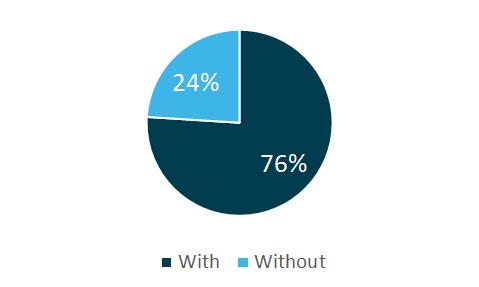April 01, 2019
In the last three issues of Innovation Insights, we have highlighted new technologies that are providing consumers with on-demand access to primary care, chronic condition management support and musculoskeletal services. In this edition, we turn to a top-of-mind issue for employers: mental health and emotional well-being.
Employers have good reasons for being concerned about mental health: Depression and anxiety have increased 15-20% globally in the last decade. More than three-quarters of U.S. employees (76%) report experiencing at least one issue that has affected their mental health, and 42% report having been diagnosed with a mental health disorder.1
While many employers have launched anti-stigma campaigns and established on-site mental health services, the digitization of effective mental health therapies – such as mindfulness, meditation and cognitive behavioral therapy (CBT) -- in conjunction with research showing that online interventions can be as effective as face-to-face delivery, offers employers additional ways to help their employees.2,3 These new solutions are gaining traction and becoming a key part of many employers’ benefit design.

High Tech and High-Touch Mental Health Care
Digital options for mental health care fall across a spectrum. At one end are self-paced digital programs designed for broad swaths of the population, with a focus on promoting positive emotional well-being. At the other end are solutions that can provide more immediate access to clinicians for treatment of diagnosable clinical conditions.
For employers seeking to improve employees’ overall emotional well-being, solutions focused on meditation, mindfulness or resilience may be of interest. Companies such as Journey Meditation, Whil and eMindful are bringing guided meditation to scale online or in the office, in the U.S. or abroad. Meditation can have profound effects on an individual’s emotional well-being: According to an NYU clinical study, daily use of Journey Meditation for 8 weeks led to significant reductions in stress, increased attention and improvement in mood.
Helping employees build resilience to prevent the negative impacts of stress and setbacks is also becoming popular. Resilience program provider meQuilibrium has proven that individuals can improve their resilience capacity by identifying – and overcoming – common stress triggers. Alongside improvements in resilience, the company is also seeing increased productivity, engagement and overall well-being among users.
In addition to programs focused on boosting emotional well-being for entire populations, some self- paced solutions – such as Happify Health, SuperBetter At Work and Big Health’s Daylight – also can be effective for a subset of the population with certain diagnosable conditions. Individuals who engaged in Happify Health’s evidence-based activities, games and meditation interventions at least two to three times a week for eight weeks experienced a 25% improvement in symptoms of both depression and anxiety and a 21% improvement in resilience. Similarly gamified, SuperBetter At Work has shown that playing SuperBetter for just 30 days significantly reduced symptoms of anxiety and depression, as well as improved optimism, self-efficacy and life satisfaction. And finally, Big Health’s Daylight offers a new way to help those with worry and anxiety. Leveraging proven cognitive behavioral therapy, Daylight provides a personalized, approachable program for the 60%-70% of individuals who don’t get help due to access and stigma challenges.
Beyond the self-guided, self-help programs are new solutions that offer employees access to a coach, therapist or physician. Solutions such as AbleTo, Ginger, Lyra and Sibly are breaking down barriers and providing more immediate access to mental health professionals in convenient, innovative ways.
Drive change with our Health Innovations Forum.
Learn More ![]()
As quickly as a text message is sent, Sibly users are matched with a team of three coaches prepared to provide 24/7 support. Users receive responses to their text messages
in minutes and can reach out to their team of coaches for support at any time. Early research results show that easy access to a supportive ear is working: 95% of users reported self-improvement after texting with a coach, and 66% showed measurable symptom improvement.
Ginger, Lyra and AbleTo offer holistic, hybrid solutions: Depending on the severity of the condition and/or the specific needs of the individual, these programs can provide access to self-guided programs leveraging evidence-based therapies. But for individuals looking for a more personal touch, access to a psychologist or psychiatrist for in-person or virtual visits can be facilitated, sometimes in as little as 48 hours. The broad capabilities of these programs are not only augmenting traditional EAP services, but in some cases, they are supplanting them.
The new innovations coming to market offer something for everyone and are narrowing the gap between those needing support and those having access to it. As one of the most funded categories in digital health, solutions to improve emotional well-being and mental health are only likely to grow.
About Innovation Insights
Innovation Insights is an e-newsletter published by Business Group on Health to share innovative programs or solutions coming to market to improve employee health and/or the efficiency, delivery or consumer experience within the health care system.
-
1 | American Heart Association. Mental Health – A Workforce Crisis. Available at:
https://ceoroundtable.heart.org/wp-content/uploads/2018/12/MENTAL-HEALTH-FULL-REPORT-FINAL-20181212.pdf. Accessed May 1, 2019. - 2 | Hedman E., et al. Cognitive behavior therapy via the Internet: a systematic review of applications, clinical efficacy and cost–effectiveness. Expert Review of Pharmacoeconomics & Outcomes Research. 2012;12(6).
- 3 | Spijkerman MPJ, Bohlmeijer. Effectiveness of online mindfulness-based interventions in improving mental health: A review and meta-analysis of randomised controlled trials. Clin Psych Rev. 2016;45:102-114.
